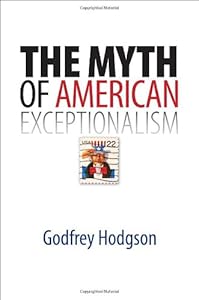Even some American intellectuals are afflicted by this peculiar aversion to the world of ideas; their aversion prompts them to deny that people participate in a shared perception of social reality based upon a worldview. Daniel Boorstin, in his book, The Genius of American Politics (Chicago: University of Chicago Press, 1953), argued that "The genius of American democracy comes not from any special virtue of the American people but from the unprecedented opportunities of this continent and from a peculiar and unrepeatable combination of historical circumstances.These circumstances have given our institutions their character and their virtues.The very same facts which explain these virtues, explain also our inability to make a "philosophy" of them. They explain our lack of interest in political theory, and why we are doomed to failure in any attempt to sum up our way of life in slogans and dogmas. They explain, therefore, why we have nothing in the line of a theory that can be exported to other peoples of the world."

Boorstin insists that the antipathy to political theory which Americans express is based upon a sound conviction that "an explicit political theory is superfluous because we already possess a satisfactory equivalent...the belief that values in America are in some way or other automatically defined: given by certain facts of geography or history peculiar to us." Professor Boorstin continues, "We have received our values as a gift from the past; that the earliest settlers or Founding Fathers equipped our nation at birth with a perfect and complete political theory...and that our theory is always implicit in our institutions." In addition, "a belief in the continuity or homogeneity of our history...makes us see our national past as an uninterrupted continuum of similar events, so that our past merges indistinguishably into our present."
Lamentably, Professor Boorstin's endorsement of this myth is hardly novel. See, for example, the extraordinary article by Steven G. Calabresi, "'A Shining City On A Hill'--and the Supreme Court's Practice of Relying on Foreign Law," Boston University Law Review, Vol. 86: 1135 (2006). In that essay, Professor Calabresi, who was one of the founders of the right-wing Federalist Society, also endorses the myth of American exceptionalism and urges the federal courts to reject the guidance of foreign law, even that of fellow common law countries, because they do not share this country's commitment to individualism and its hostility to socialist ideology and policies.
Unfortunately, the argument that America is somehow exceptional or unique is profoundly ahistorical and anti-intellectual. Essentially, it denies that humans are sentient beings who understand social reality based upon the sets of ideas which constitute their worldview. From where did the ideas of the Founders come? If American values are always implicit in American institutions, were the implicit values just randomly chosen from some kind of intellectual smorgasbord, or was the creation of these institutions the result of some overarching design--i.e. a political theory? Did the choice of institutions create the values which Boorstin praises as "a perfect and complete political theory," or did the chosen values create the institutions?
An important part of the explanation for the tendency of Americans to dismiss or minimize the role of a political philosophy in informing our understanding of politics, personally and collectively, is the pervasive and often unconscious acceptance of the postulates of John Locke's liberalism.In fact, the origin of the very pragmatism or common sense for which Americans so often laud themselves may be traced back to the epistemological concepts that emerged after the Protestant Reformation.
These ideas were systematically explicated in the philosophies of Thomas Hobbes and John Locke. Subsequently, this penchant for "common sense" reasoning was transmitted to the New World where it was popularized by Puritan divines such as Jonathan Edwards and became part of what has been described as the New England Mind. To quote Louis Hartz, in his seminal study on the influence of John Locke's ideas upon American politics, The Liberal Tradition in America (New York:Harcourt Brace, 1955), "Pragmatism, interestingly enough America's greatest contribution to philosophic tradition...feeds itself on the Lockean settlement. It is only when you take your ethics for granted that all problems emerge as problems of technique."
Hartz argues that, to extent to which America may be described as exceptionalist, it is precisely because as a political culture, American culture remains the epitome of Locke's essential political philosophy, removed and uprooted from its historic context in England, unmediated by the existence of an ancien regime with its contrarian Catholic, communitarian values. Locke's political philosophy, once adopted, elaborated and acted out upon a vast wilderness of free land which was encumbered only by the presence of some troublesome savages. America is thus exceptional because we remain imprisoned in an early eighteenth century intellectual universe, unable to comprehend what came before in Europe or what followed after.
To the extent to which American politics remains "locked in Locke," we will become increasingly unable to adapt and respond to the new challenges and demands that confront this country in the twenty-first century, or to imagine alternatives to the status-quo, irrespective of whether the issue is pervasive unemployment, the hollowing-out of the middle class, global warming and the emerging energy crisis, the delivery and provision of heath care, or reigning in the military-industrial complex that has created a welfare-through-warfare culture.
Witness the nostrums and platitudes spewed forth by right-wing Republicans like Newt Gingrich, Chris Christie, Mike Huckabee, Scott Walker, their media surrogates and legion of adoring Tea Party supporters. Where is the evidence that shows that dismantling this country's safety-net in the name of austerity, destroying unions, and further weakening public regulation of corporations, while granting yet additional tax-cuts to the wealthiest could possibly do anything except to dig us deeper in the hole into which we have already collectively fallen? Aren't these precisely the kind of policy prescriptions that could only be endorsed by someone whose understanding of political and economic theory has not evolved beyond the in the eighteenth century?








